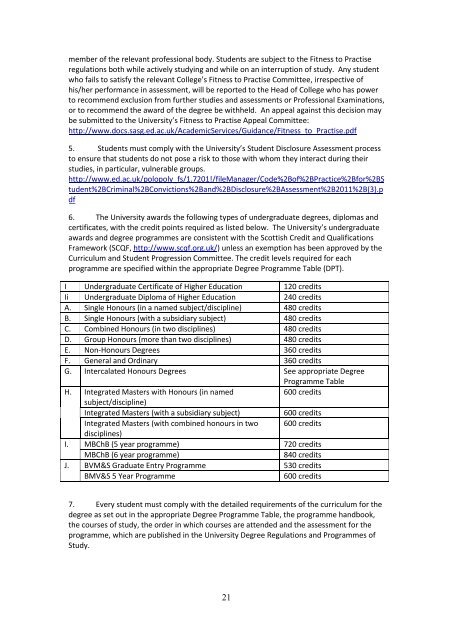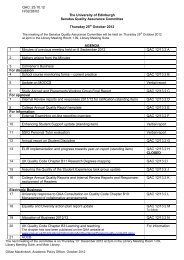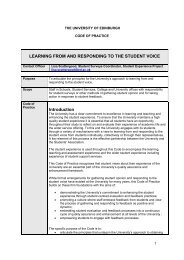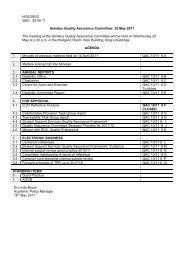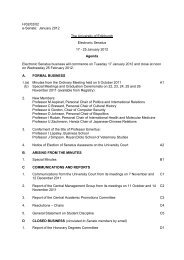Chapter 3 â Policy Implications for Gaelic - University of Edinburgh
Chapter 3 â Policy Implications for Gaelic - University of Edinburgh
Chapter 3 â Policy Implications for Gaelic - University of Edinburgh
Create successful ePaper yourself
Turn your PDF publications into a flip-book with our unique Google optimized e-Paper software.
member <strong>of</strong> the relevant pr<strong>of</strong>essional body. Students are subject to the Fitness to Practise<br />
regulations both while actively studying and while on an interruption <strong>of</strong> study. Any student<br />
who fails to satisfy the relevant College’s Fitness to Practise Committee, irrespective <strong>of</strong><br />
his/her per<strong>for</strong>mance in assessment, will be reported to the Head <strong>of</strong> College who has power<br />
to recommend exclusion from further studies and assessments or Pr<strong>of</strong>essional Examinations,<br />
or to recommend the award <strong>of</strong> the degree be withheld. An appeal against this decision may<br />
be submitted to the <strong>University</strong>’s Fitness to Practise Appeal Committee:<br />
http://www.docs.sasg.ed.ac.uk/AcademicServices/Guidance/Fitness_to_Practise.pdf<br />
5. Students must comply with the <strong>University</strong>’s Student Disclosure Assessment process<br />
to ensure that students do not pose a risk to those with whom they interact during their<br />
studies, in particular, vulnerable groups.<br />
http://www.ed.ac.uk/polopoly_fs/1.7201!/fileManager/Code%2B<strong>of</strong>%2BPractice%2B<strong>for</strong>%2BS<br />
tudent%2BCriminal%2BConvictions%2Band%2BDisclosure%2BAssessment%2B2011%2B(3).p<br />
df<br />
6. The <strong>University</strong> awards the following types <strong>of</strong> undergraduate degrees, diplomas and<br />
certificates, with the credit points required as listed below. The <strong>University</strong>’s undergraduate<br />
awards and degree programmes are consistent with the Scottish Credit and Qualifications<br />
Framework (SCQF, http://www.scqf.org.uk/) unless an exemption has been approved by the<br />
Curriculum and Student Progression Committee. The credit levels required <strong>for</strong> each<br />
programme are specified within the appropriate Degree Programme Table (DPT).<br />
I Undergraduate Certificate <strong>of</strong> Higher Education 120 credits<br />
Ii Undergraduate Diploma <strong>of</strong> Higher Education 240 credits<br />
A. Single Honours (in a named subject/discipline) 480 credits<br />
B. Single Honours (with a subsidiary subject) 480 credits<br />
C. Combined Honours (in two disciplines) 480 credits<br />
D. Group Honours (more than two disciplines) 480 credits<br />
E. Non-Honours Degrees 360 credits<br />
F. General and Ordinary 360 credits<br />
G. Intercalated Honours Degrees See appropriate Degree<br />
Programme Table<br />
H. Integrated Masters with Honours (in named<br />
600 credits<br />
subject/discipline)<br />
Integrated Masters (with a subsidiary subject)<br />
600 credits<br />
Integrated Masters (with combined honours in two 600 credits<br />
disciplines)<br />
I. MBChB (5 year programme) 720 credits<br />
MBChB (6 year programme)<br />
840 credits<br />
J. BVM&S Graduate Entry Programme 530 credits<br />
BMV&S 5 Year Programme<br />
600 credits<br />
7. Every student must comply with the detailed requirements <strong>of</strong> the curriculum <strong>for</strong> the<br />
degree as set out in the appropriate Degree Programme Table, the programme handbook,<br />
the courses <strong>of</strong> study, the order in which courses are attended and the assessment <strong>for</strong> the<br />
programme, which are published in the <strong>University</strong> Degree Regulations and Programmes <strong>of</strong><br />
Study.<br />
21


